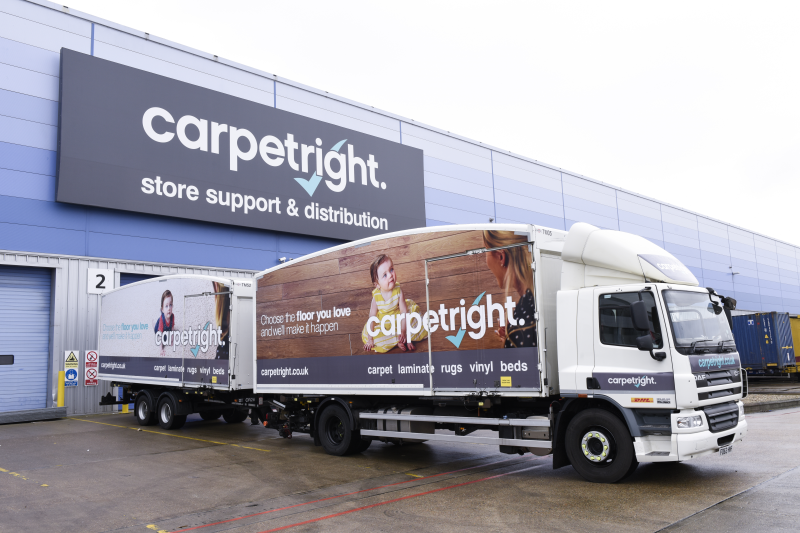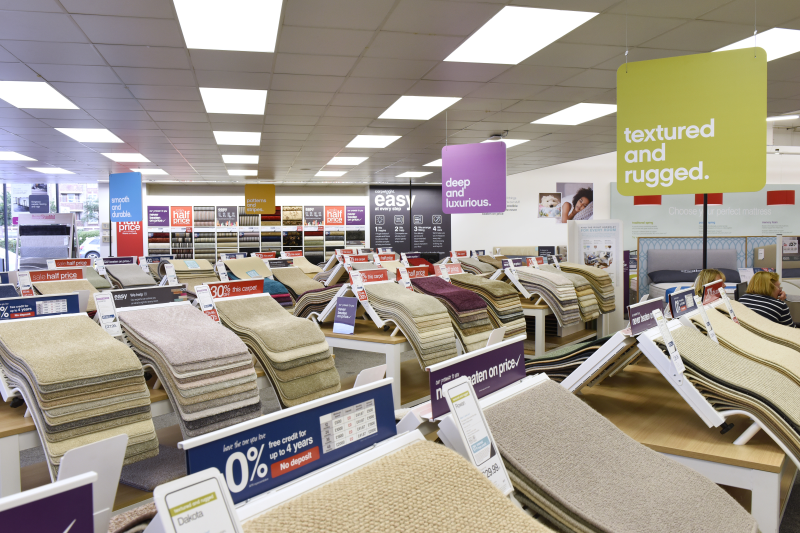
The struggling flooring retailer posted pre-tax losses of £70.5million for the year ended April 28 and says trading at the start of the new financial year was impacted by the ongoing CVA and withdrawal of some suppliers, leading to stock shortages.
Group revenue dropped 3% to £443.8million for the year, with an underlying pre-tax loss of £8.7million, in-line with previous guidance, said the company. Net debt saw a huge increase from £9.8million to £53million, highlighting a decline in operating performance and the tightening of credit terms by what the firm described as “suppliers responding to adverse publicity surrounding the group’s restructuring”.
Meanwhile, separately-reported items of £61.8million, driven mainly by the costs and accounting impact of the restructuring activity, lead to a statutory loss before tax of £70.5million against a £0.9million profit in 2017.
In tough trading conditions, like-for-like sales in the full year declined by 3.6% with a decrease of 7.8% in second half of the year; offsetting the increase of 0.7% reported for the first half. As expected, trading in the first eight weeks of the new financial year was heavily impacted by the disruption arising from the group’s restructuring activity, including stock shortages, as some suppliers had withdrawn supply, and the period of exceptionally warm weather.
Describing it as a "transitional year" for the business, Carpetright chief executive Wilf Walsh remains confident the restructuring plan will prove successful, despite the impact on trading in the short-term. “The three headwinds of our legacy property estate, increased competition and a downturn in consumer spending all combined to make 2017/18 a year to put behind us,” he said.
“The CVA and recapitalisation offers us the significant chance to rebuild as a profitable market leader with outstanding brand awareness and we do not intend to miss this opportunity. We will not be diverted from our plan to transform the Carpetright business. The four main planks of our strategy remain relevant and finally we have comprehensively tackled our significant and ultimately, debilitating property issues.”
He added: “Completing the turnaround will take time and the road ahead remains a challenging one - but we now have the resources to fully fund our revised business plan. Implementation of the CVA is well underway and the 92 closures will be complete by end September.”
A revamp of the existing Carpetright portfolio continues, with 227 UK stores - amounting to 55% of the UK estate - trading under the new brand identity by the end of April 2018. Refurbished stores continue to outperform the uninvested estate, says the company, and all remaining UK stores are to receive additional investment by the end of the CVA period in 2021; with priority being given to most profitable sites.
Additionally, like-for-like sales of hard flooring increased by 9.2% in the UK, reflecting a greater strategic focus on this category, said the company.
City Index senior market analyst Fiona Cincotta, said of Carpetright’s results: “Adjusted profits have met the company's guidance, but a lot of red ink has been spilled here. And it will be hard to scrub out the stain.”
“On the positive side, the performance of the hard flooring business is encouraging, as Carpetright adjusts to consumer preferences for longer-lasting and easier-to-clean surfaces.”
“The new design format has now been rolled out to more than half the store portfolio and many of those individual outlets are capable of turning a profit.”
“Overall, though, there's little in the outlook statement to give investors a great deal of confidence that the worst is over for Carpetright.”
“Even with interest-free credit on offer, consumers are still bristling at the idea of dishing out thousands of pounds on big-ticket items.”
“With rival Tapi showing few signs of blinking, a swift recovery in margins isn't assured, even if consumer confidence improves.”
Meanwhile, Duologi CEO Gary Little commented: “Consumers are shopping online more than ever before. However, this does not mean that the high street is dying – far from it. We’re simply seeing a shift in the retail landscape. For many, the high street no longer represents a cost-effective or convenient way to purchase, so savvy brands are working to optimise online presence to sit alongside their bricks-and-mortar offering. This is particularly true for big-ticket items such as homeware.
"The retailers set to thrive in this new landscape are those flexible, agile brands that can offer customers a choice in how, where and when they shop. Retailers must adapt and move with these changing times as a matter of urgency."
